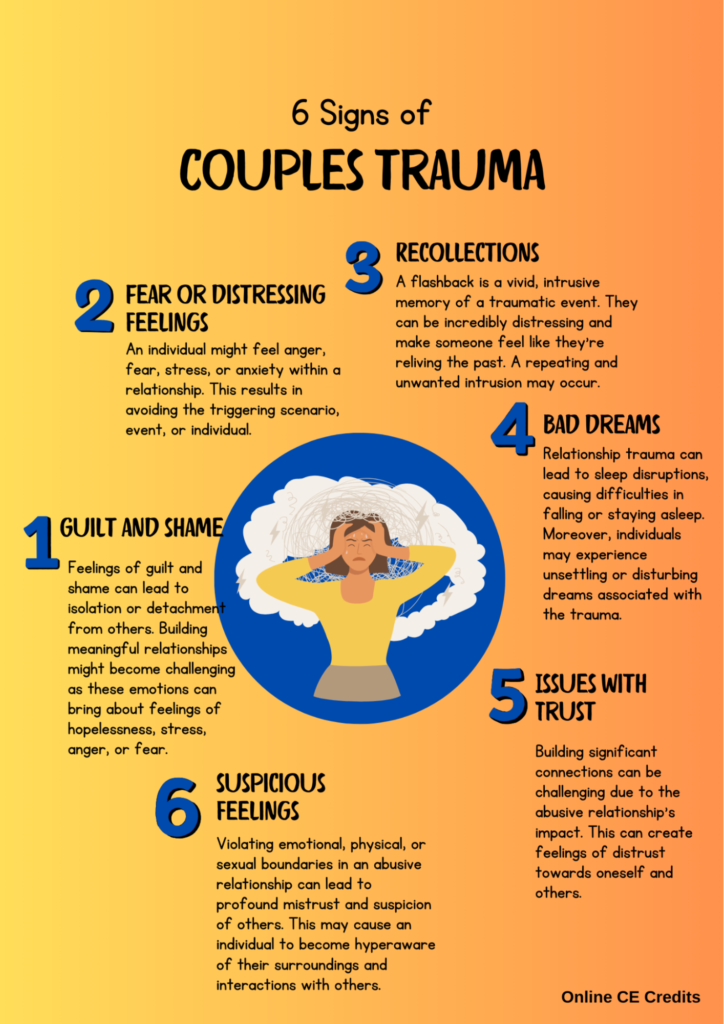Couples therapy is a cornerstone of relationship healing, offering a space where partners can work through challenges together. However, when traditional methods seem to stall, introducing Eye Movement Desensitization and Reprocessing (EMDR) into couples therapy can unlock deeper levels of connection and understanding. This approach integrates the trauma-focused technique of EMDR into the relational dynamics of couples, helping partners address current conflicts and the underlying issues often rooted in past experiences.
For these reasons, Online CE Credits’ certification in EMDR covers the latest evidence-based therapies from seasoned practitioners with decades of experience. With this program, you can up your game in couples therapy to promote your clients’ healing.
Understanding EMDR’s Role in Couples Therapy
EMDR is often associated with treating trauma, but its applications extend beyond individual therapy. By focusing on how past traumas influence present behavior, EMDR provides a pathway for couples to explore how their personal histories impact their relationship. For many couples, unresolved trauma is an invisible barrier to intimacy, trust, and effective communication. EMDR helps by bringing these issues to the forefront in a way that feels safe and manageable, allowing both partners to address and process them together.
Imagine a couple where one partner has a history of abandonment. Even in a healthy relationship, this fear may manifest as PTSD, anxiety, distrust, or even sabotage. The partner might react disproportionately to perceived slights, creating tension that seems inexplicable. EMDR can help identify the root of these reactions, enabling the couple to see them not as personal failings but as remnants of past trauma. This understanding alone can transform how they relate to each other.
6 Signs of Couples Trauma (Infographic)

Creating a Safe Space for Healing
One of the most critical aspects of integrating EMDR into couples therapy is creating a safe space where both partners feel supported. This process often begins with individual sessions where each person works through their trauma separately. These sessions stabilize intense emotions and enable couples to approach each other from a place of empathy rather than defensiveness when they come together.
For example, during individual EMDR sessions, one partner might process memories related to childhood neglect. This processing could lead to a better understanding of why they struggle with vulnerability in their current relationship. Once both partners have had the opportunity to explore their histories, they come together in couples sessions, bringing a new level of awareness and readiness to connect.
Fostering Mutual Understanding and Empathy
In couples therapy, EMDR is not just about healing past wounds—it’s also about fostering mutual understanding and empathy. As partners share their experiences, they begin to see each other as the person standing before them and as individuals shaped by their pasts. This perspective shift can soften judgments, making it easier to approach conflicts with compassion.
Let’s consider a situation where one partner has experienced significant trauma that the other doesn’t fully understand. Without EMDR, the non-traumatized partner might struggle to empathize, leading to feelings of isolation and resentment. With EMDR, the process of sharing and understanding these experiences can create a bridge between them. They begin to see each other’s reactions not as random or irrational, but as understandable responses to deep-seated fears and hurts.
Enhancing Communication and Conflict Resolution
EMDR’s impact on communication in couples therapy is profound. Often, past traumas disrupt how individuals express themselves or listen to their partners. They might shut down, become overly defensive, or misinterpret their partner’s intentions. EMDR helps clear these emotional blockages, paving the way for more open and effective communication.
For instance, a partner who has always responded to conflict with anger might, through EMDR, uncover a history of feeling unheard or dismissed as a child. Understanding this link allows them to articulate their feelings more clearly and respond to their partner without the cloud of past pain. The other partner, in turn, can respond with greater empathy, knowing the deeper reasons behind the anger. This mutual understanding can significantly reduce the frequency and intensity of conflicts, allowing the couple to navigate disagreements in a more constructive manner.
Strengthening Emotional Bonds
EMDR doesn’t just help couples manage conflict; it can also deepen their emotional connection. When partners process their traumas together, they often experience a renewed sense of intimacy. They see each other’s vulnerabilities and strengths more clearly, leading to a deeper bond. This emotional intimacy is the bedrock of a strong relationship, providing resilience against future challenges.
Consider a couple who has been distant due to unaddressed trauma. As they go through EMDR together, they start to feel more connected. This is because they’re resolving past issues together. They begin to see their relationship as a safe haven, a place where they can heal and grow as a unit. This shift can turn a struggling relationship into a thriving one.
Advance Your Career in Couples Therapy With Trauma-Focused Courses
Wish you knew about our nationally approved certifications sooner? Our continuing education courses can help you achieve your professional goals faster than you ever thought possible. Enroll in the accredited CE courses below to enhance your trauma therapy for couples.
- Treating Complex Trauma With Internal Family Systems: Evidence-Based Tools
- Narcissism, Hypersexuality, and Betrayal Trauma in Relationships: Treatment Tools
- Written Exposure Therapy: Evidence-Based Tools for Trauma and PTSD
- Trauma in the Family: Concrete Skills to Achieve Long-term Healing and Stability
- “Out of It”: Trauma-Related Dissociation and Powerful Tools to Promote Reconnection
Real-Life Success Stories
Real-world examples highlight how transformative EMDR can be for couples.
One couple was on the brink of separation due to constant arguments and misunderstandings. However, they discovered through EMDR that they were reacting to unresolved trauma—one from a chaotic childhood and the other from a history of emotional neglect. By working through these issues in individual and joint sessions, they understood each other’s triggers and needs more clearly. This understanding led to fewer arguments and a stronger, more compassionate connection.
Another couple found that EMDR helped them break a cycle of mistrust. One partner’s past infidelity had shattered the trust in their relationship, and despite their best efforts, they couldn’t move past it. Through EMDR, the unfaithful partner processed the guilt and shame that fueled their destructive behavior, while the other partner worked through the betrayal trauma. Over time, they rebuilt trust on a foundation of honesty and mutual understanding, something they hadn’t thought possible before starting EMDR.
Integrating EMDR with Traditional Couples Therapy

EMDR doesn’t replace traditional couples therapy but enhances it. Therapists often blend EMDR with techniques like Emotionally Focused Therapy (EFT) or the Gottman Method, creating a comprehensive approach that addresses both the emotional and cognitive aspects of relationship challenges. By combining these methods, therapists can offer a more tailored experience that meets each couple’s unique needs.
For example, a therapist might use EMDR to help one partner process trauma that’s impacting their ability to engage in EFT’s emotional bonding exercises. Or, they might integrate EMDR with the Gottman Method’s focus on communication and conflict resolution. This ensures past traumas don’t derail the progress being made in therapy. The integration allows for a more personalized and effective therapy experience.
The Future of Relationship Healing
In the hands of a skilled therapist, EMDR couples therapy offers a powerful way to address the deeper issues that often underlie relationship struggles. It provides a pathway for managing conflict and fostering understanding, empathy, and connection. For couples willing to embark on this journey, EMDR can be a transformative experience. It can strengthen their relationship and lay the groundwork for a healthier, happier future together.
As more therapists integrate EMDR into their work with couples, the potential for this approach to revolutionize relationship therapy continues to grow. The benefits of EMDR go beyond helping couples cope with their challenges; they help them thrive. Begin your learning experience today.